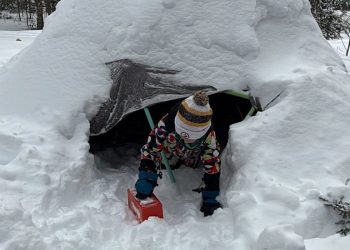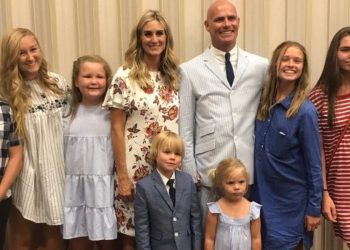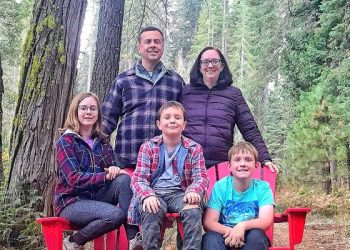- We have three kids, ages 7, 9, and 12
- We’ve talked about the privileges and responsibilities revolving around independence as they age.
- This has helped them gain the independence they need while giving us the ability to trust them.
I grew up in the generation of latchkey kids, hearing “come home when the street lights are on” as I was propelled out the door in the early morning with no water bottle in sight.
While I think that approach leaves a lot to be desired, the incredible freedom this kind of childhood allowed also has its benefits. The independence, responsibility, and problem-solving skills, alongside the confidence and joy in figuring out what to do with yourself as a kid, were priceless, in my opinion.
When I became a parent, I realized I wanted to give my kids as much freedom as possible.
We create scaffolding around independence for our kids
I share typical parenting concerns around safety and capability when it comes to my kids. For this reason, our family has created scaffolding around our kids’ independence. It is both age and ability-based.
For example, we would let our kids play outside in our yard, starting around 4 or 5 years old, provided we trusted they wouldn’t wander out into the neighborhood. From there, they can walk to a nearby friend’s house or a corner store and build up to bike around our neighborhood — to the park, library, or an ice cream shop, among other spots, by the age of 10.
We started these journeys with them by letting them lead the way on family outings. We’d see if they looked for cars before crossing a road, could competently pay alone at the store, or knew the correct rules of riding a bicycle on the streets. Once we saw they could do these things successfully, they were able to do them on their own.
Even with our preparation, it doesn’t always work out well. Once, our oldest child went to the store and was short on money. She was embarrassed, but it taught her a great lesson about considering taxes and handling an uncomfortable situation. Ultimately, that’s one of the points of this exercise in independence for us.
Our kids gain privileges alongside responsibilities
We also consider the impact responsibilities have on our kids’ independence. Starting early (the toddler years), we encourage our kids to help us with household chores like emptying the dishwasher, folding towels, cleaning up common areas, and keeping their rooms clean. Eventually, we have them move into doing these on their own. They take over their laundry when they are 10 and become responsible for cooking family dinner one night a week around age 12 (with parental assistance as needed.)
This is a trade-off. As they gain more responsibilities, they also gain more freedom around things such as when they can have screen time and what they can watch. It isn’t exactly a tit-for-tat situation, but the combination of privileges and responsibilities contributes to our kids’ growing independence.
Best of all, these responsibilities they are learning teach each of them important life skills and accountability. There have definitely been days when our older kids didn’t have clothes they wanted to wear because they put off doing laundry for slightly too long. One result of this was that our daughter added a calendar reminder for herself for laundry day (which is how I keep track of laundry day, funnily enough.)
I believe ever-evolving independence is a crucial step in childhood.
We are lucky enough to live in Colorado, one of only eight states that protects “reasonable independence” for kids, but I think every kid can benefit from opportunities like this to grow their independence. One day, they will need to be able to live in the world on their own. How else will they gain confidence in decision-making and the ability to manage themselves in different environments if we don’t allow them to make mistakes in a safe environment?
Beyond that, this balance between privileges and responsibilities strengthens our trust in each other as parents and children. Of course, it’s valuable for them, but it also has a huge value to me to see what they are capable of and how much they can do. The learning opportunities they experience when mistakes happen, like forgetting their responsibilities or misusing privileges, help us raise capable, confident kids.
To me, that’s priceless.
- We have three kids, ages 7, 9, and 12
- We’ve talked about the privileges and responsibilities revolving around independence as they age.
- This has helped them gain the independence they need while giving us the ability to trust them.
I grew up in the generation of latchkey kids, hearing “come home when the street lights are on” as I was propelled out the door in the early morning with no water bottle in sight.
While I think that approach leaves a lot to be desired, the incredible freedom this kind of childhood allowed also has its benefits. The independence, responsibility, and problem-solving skills, alongside the confidence and joy in figuring out what to do with yourself as a kid, were priceless, in my opinion.
When I became a parent, I realized I wanted to give my kids as much freedom as possible.
We create scaffolding around independence for our kids
I share typical parenting concerns around safety and capability when it comes to my kids. For this reason, our family has created scaffolding around our kids’ independence. It is both age and ability-based.
For example, we would let our kids play outside in our yard, starting around 4 or 5 years old, provided we trusted they wouldn’t wander out into the neighborhood. From there, they can walk to a nearby friend’s house or a corner store and build up to bike around our neighborhood — to the park, library, or an ice cream shop, among other spots, by the age of 10.
We started these journeys with them by letting them lead the way on family outings. We’d see if they looked for cars before crossing a road, could competently pay alone at the store, or knew the correct rules of riding a bicycle on the streets. Once we saw they could do these things successfully, they were able to do them on their own.
Even with our preparation, it doesn’t always work out well. Once, our oldest child went to the store and was short on money. She was embarrassed, but it taught her a great lesson about considering taxes and handling an uncomfortable situation. Ultimately, that’s one of the points of this exercise in independence for us.
Our kids gain privileges alongside responsibilities
We also consider the impact responsibilities have on our kids’ independence. Starting early (the toddler years), we encourage our kids to help us with household chores like emptying the dishwasher, folding towels, cleaning up common areas, and keeping their rooms clean. Eventually, we have them move into doing these on their own. They take over their laundry when they are 10 and become responsible for cooking family dinner one night a week around age 12 (with parental assistance as needed.)
This is a trade-off. As they gain more responsibilities, they also gain more freedom around things such as when they can have screen time and what they can watch. It isn’t exactly a tit-for-tat situation, but the combination of privileges and responsibilities contributes to our kids’ growing independence.
Best of all, these responsibilities they are learning teach each of them important life skills and accountability. There have definitely been days when our older kids didn’t have clothes they wanted to wear because they put off doing laundry for slightly too long. One result of this was that our daughter added a calendar reminder for herself for laundry day (which is how I keep track of laundry day, funnily enough.)
I believe ever-evolving independence is a crucial step in childhood.
We are lucky enough to live in Colorado, one of only eight states that protects “reasonable independence” for kids, but I think every kid can benefit from opportunities like this to grow their independence. One day, they will need to be able to live in the world on their own. How else will they gain confidence in decision-making and the ability to manage themselves in different environments if we don’t allow them to make mistakes in a safe environment?
Beyond that, this balance between privileges and responsibilities strengthens our trust in each other as parents and children. Of course, it’s valuable for them, but it also has a huge value to me to see what they are capable of and how much they can do. The learning opportunities they experience when mistakes happen, like forgetting their responsibilities or misusing privileges, help us raise capable, confident kids.
To me, that’s priceless.








